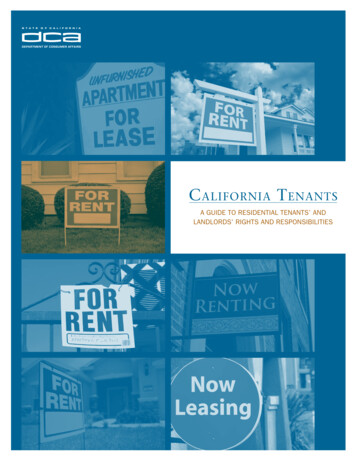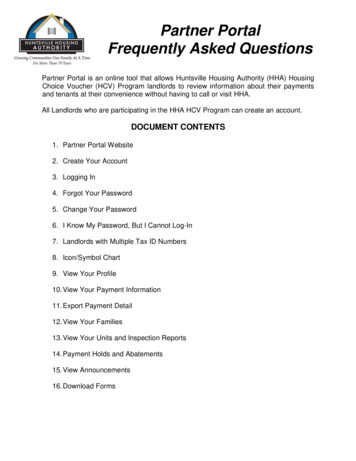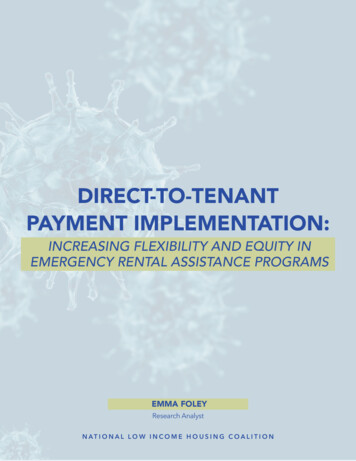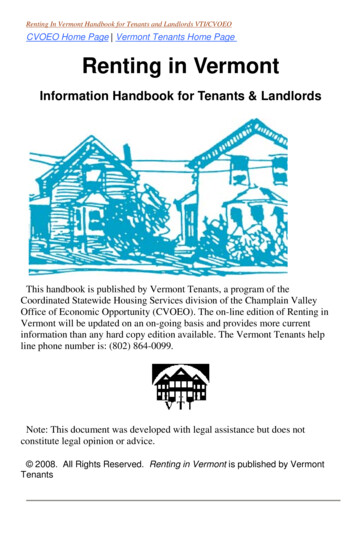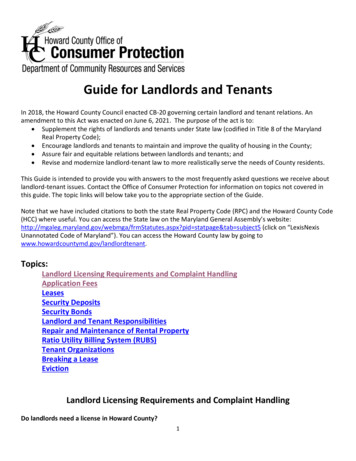
Transcription
Guide for Landlords and TenantsIn 2018, the Howard County Council enacted CB-20 governing certain landlord and tenant relations. Anamendment to this Act was enacted on June 6, 2021. The purpose of the act is to: Supplement the rights of landlords and tenants under State law (codified in Title 8 of the MarylandReal Property Code); Encourage landlords and tenants to maintain and improve the quality of housing in the County; Assure fair and equitable relations between landlords and tenants; and Revise and modernize landlord-tenant law to more realistically serve the needs of County residents.This Guide is intended to provide you with answers to the most frequently asked questions we receive aboutlandlord-tenant issues. Contact the Office of Consumer Protection for information on topics not covered inthis guide. The topic links will below take you to the appropriate section of the Guide.Note that we have included citations to both the state Real Property Code (RPC) and the Howard County Code(HCC) where useful. You can access the State law on the Maryland General Assembly’s tes.aspx?pid statpage&tab subject5 (click on “LexisNexisUnannotated Code of Maryland”). You can access the Howard County law by going dlord Licensing Requirements and Complaint HandlingApplication FeesLeasesSecurity DepositsSecurity BondsLandlord and Tenant ResponsibilitiesRepair and Maintenance of Rental PropertyRatio Utility Billing System (RUBS)Tenant OrganizationsBreaking a LeaseEvictionLandlord Licensing Requirements and Complaint HandlingDo landlords need a license in Howard County?1
Yes. The owner of a dwelling unit must have a rental housing license before entering into a lease with atenant. The landlord must provide a copy of the license to the tenant, or if the landlord has not yet receivedthe license, provide a copy of the application for the license to the tenant and provide a copy of license to thetenant not later than 7 days before the lease terms begins (HCC17.1008). Rental Housing Licenses are issuedby the Department of Inspections, Licensing and Permits (DILP). To find out whether a property is currentlylicensed call DILP at 410-313-1830If the owner fails to provide the notice, the tenant may, at any time before the licensed is obtained, terminatethe lease without penalty. HCC 17.1008(C).Leases must state that if the owner fails to maintain a rental housing license for 15 consecutive calendar daysor more during the tenant’s lease period, the tenant may terminate the lease without penalty and get backtheir security deposit (less damages plus interest). HCC 17.1009(B).What are the requirements for getting a license?Before a landlord can obtain a license, s/he must pay a fee and meet the requirements of Howard CountyProperty Maintenance Code for Rental Housing. A rental housing license is valid for a period of 2 years butmay be revoked or suspended by the Director of DILP if the landlord violates the Code requirements. For moreinformation on getting a license, go to: ionsLicenses-and-Permits/Forms-and-Fees or call 410-313-1830.Does DILP handle tenant complaints?DILP will handle complaints that allege that the property does not meet the requirements of the HowardCounty Property Maintenance Code for Rental Housing.Who handles Housing Choice Vouchers?For information about the Housing Choice Voucher Program, contact the Howard County Department ofHousing and Community Development: http://www.howardcountymd.gov/Departments.aspx?ID 2292; or call410-313-6320.Who handles housing discrimination complaints?For questions and complaints about unlawful discrimination, contact the Howard County Office of HumanRights: http://www.howardcountymd.gov/departments.aspx?ID 1777 or call 410-313-6430.What can the Howard County Office of Consumer Protection (OCP) do?Under the County law on Landlord Tenant Relations (see section HCC 17.1004), OCP has the authority to: investigate and mediate complaints against landlords who violate Howard County’s landlord tenant lawor engage in deceptive or unfair trade practices, including most violations of the Maryland’s LandlordTenant Act. initiate its own investigations; enforce the landlord tenant law to the same extent as consumer protection law.o Landlords must make records available for inspection at reasonable times2
o OCP may issues subpoenas to compel the production of evidence; adopt regulations necessary to implement the law; educate tenants & landlords through public hearings, meetings, written publications and other means.OCP can seek civil penalties (the first violation is a class B offense [ 250 - 500 fine], subsequent violations areclass A offenses [ 500 - 1000 fine]) and/or bring a civil action for fines of up to 500 per violation,injunctions, restraining orders or other appropriate relief to correct the violation. HCC 17.1016Can I sue my landlord for violating landlord tenant laws?Yes. You can exercise your rights or seek a remedy in court for violations of both State and County law. HCC17.1017Applications(HCC 17.1007 and 908, RPC 8-213)What information should be given to applicants?The application must explain the liabilities will be incurred by signing the application.Applicants must be given a copy of the proposed lease when they submit their applications.If the landlord intends to obtain a copy of the applicant’s credit report, the application must say so. If theapplication is denied because of information in the credit report, the landlord must provide the name andaddress of the credit reporting agency that issued the report, advise the applicant of his/her right to get a copyof the report and dispute inaccurate information as provided by state law.Can the landlord charge an application fee?If a landlord charges an application fee that exceeds 25, the application must state: The landlord may only keep that portion of the fee that was actually expended for a credit report orother expenses to process the application; The excess amount must be refunded within 15 days after the tenant has moved in or within 15 daysafter either the tenant or landlord has given written notice of their decision not to rent. If the landlord doesn’t return the fees as required, it will be liable for twice the amount of the fees indamages.What if the landlord withholds more than 25 of the application fee?The tenant should ask the landlord to provide a written explanation of exactly what expenses were incurred.If the tenant is not satisfied with the explanation, s/he can file a complaint with the Office of ConsumerProtection.What happens when the application is approved?When the application is approved, the landlord must give the applicant: A written notice that they can look at the unit , or a substantially similar unit before signing the lease,and if on final inspection before the lease terms begins, the tenant finds the dwelling unit not to be3
substantially similar to the dwelling unit than was originally shows, the tenant may select a differentdwelling unit or terminate the lease.A written notice that the landlord must have a license before the unit is occupied, and that if thelandlord fails to provide this notice, the tenant may terminate the lease without penalty and get backtheir security deposit (less damages plus interest).A copy of the governing documents of any common ownership community that bind the landlord andaffects the use and occupancy of the unit or common areas, andA copy of OCP’s Tenant Assistance publication, written in English and any other language of thetenant’s choice, if the office makes the publication available in that language; provided that, thenotification of this tenant right is offered to the prospective tenant in all languages available at thetime of application. (HCC 17.1008 B (iv))The landlord must obtain the applicant’s written acknowledgement of receipt of this information.LeasesWhat is a lease?A lease is a contract between a tenant and landlord for the rental of property.How long do leases run?A lease can run for a set period of time (such a year), or run “month-to-month.” Month-to-month leasescontinue indefinitely until either the landlord or tenant provides the other with notice of their intention to endthe tenancy. A lease with a set-duration terminates at the end of the stated period. Some leases, however,contain a clause that provides that the lease will “automatically renew” for another term unless one of theparties notifies the other of his/her intention to terminate (see below). Automatic renewal clauses must be setapart from other lease terms and be signed/initialed by the tenant to be effective. RPC 8-208(e).Does a lease have to be in writing?Yes. In Howard County, landlords must provide written leases. Lease addendums can be used if initialed by thetenant. HCC17.1003(C)Is there a limit on how much the landlord can charge for rent?No. There are no state-wide or Howard County rent control laws. Tenants should, therefore, comparison shopto find the best rental property for their budget.Are the terms of a lease negotiable? Can tenants request changes to a landlord’s standard lease?Yes. While many landlords use a “standard lease” for all their tenants, there is nothing to prevent tenantsfrom negotiating their own terms with the landlord. If the landlord has made any verbal promises orrepresentations, the tenant should request they be added to the lease.Additional terms can be written on the agreement and terms that are unacceptable can be crossed out so longas the landlord agrees and they are not contrary to state or local laws or ordinances. Tenants should makesure that all changes are dated and initialed by both parties.4
What terms are required by law to be in a lease?Under HCC 17.1009 and RPC 8-208, leases must state: Where the tenant can inspect the landlord’s rental housing license and that if the landlord fails torenew its license during the lease period, the tenant may terminate the lease without penalty; If the landlord receives a notice of violation of the County’s rental housing code, and does not correctthe violation by the date specified by the Department of Inspections, Licensing and Permits, the tenantmay either terminate the lease without penalty or request that a rent escrow account be establishedfor the payment of rent until the violation, condition or defect is abated. That the premises will be delivered in a clean, habitable and sanitary condition, free of rodents orvermin, and in compliance with all applicable laws; The landlord’s responsibility for maintaining the unit according to Howard County Law and incorporateby reference the County’s building, fire prevention, property maintenance codes and zoningregulations as an express warranty of habitability and covenant to repair; Specify the landlord and tenant’s obligations to supply and pay for heat, gas, electricity, water, sewerservice, trash collection, repair of the premises and similar services. If the tenant is required to pay thelandlord for such services, the landlord cannot collect more than the amount listed on an itemizedinvoice and must provide substantiation upon request; If a Ratio Utility Billing System (RUBS) is used to calculate a tenant’s utility payment, specificinformation (described below) about the system and how payments will be calculated; State that security deposits will be collected, deposited and retuned as required by State law, and thatupon request, the landlord must provide written substantiation of the damage and costs incurred tocorrect the damage. RPC 8-203.1 requires a receipt (can be included in the lease) for the securitydeposit be given that contains the tenant’s security deposit rights, including that the tenant may bepresent when the landlord inspects the premises for damage and describe the procedure for exercisingthat right; State that written receipts will be given for cash or money order payments; State when the landlord may enter the dwelling unit, as discussed below. State the conditions (listed below) under which a lease may be terminated early. If the unit is in a common ownership community, state that any obligation imposed on the owner ofthe unit that affects the use and occupancy of the unit or common area is enforceable against thetenant. Provide the name, address and telephone number of the landlord or the person who is authorized toaccept service of process on behalf of the landlord (alternatively, this may be posted in a conspicuousplace on the property instead of in the lease).5
What terms are prohibited by law from being in a lease?Under HCC 17.1010 and RPC 8-208, a lease may not: authorize a confessed judgment, whereby tenants waive their right to defend themselves; waive their right to a jury trial, waive any of the tenant’s rights or remedies provided by law (including: landlord’s duty to mitigatedamages [RPC section 8-207(d)], and the tenant’s right to deduct from rent any money paid for utilityservice if the lease requires the landlord to pay the utility bill [RPC Section 8-212.3]); state that the tenant agrees to a period required for landlord’s notice to quit that is less than thatprovided by law; give the landlord the right to evict the tenant or take the tenant’s personal possessions without a courtjudgment; state that the tenant agrees to pay court costs, legal fees or attorney fees other than those that a courtawards for the tenant’s breach of lease; impose a penalty or subject the tenant to legal action for non-payment of rent if the delinquentpayment is made within six days after the date on which the rent is due; unless the tenant is in arrearsfrom the previous month; impose a penalty of more than five percent of the amount of rent due for the period for which thepayment is delinquent; require that a tenant pay to replace or repair structural elements of the building, major appliances orelectrical, plumbing, heating or air conditioning systems unless replacement or repair is requiredbecause of the actions of the tenant or person for whom the tenant is responsible; require the tenant to pay any money other than an application fee, security deposit, rent, utilitycharges specified in the lease or fees for specified amenities or common areas that the tenant mayelect to use, including but not limited to dedicated parking spaces, pools or fitness facilities; require the tenant to pay a transfer fee or other money for moving from one unit to another within anapartment complex during the lease period, but the landlord may withhold money from the securitydeposit for damage to the original unit and apply the remainder to the security deposit on the newunit; allow a landlord to evict a tenant or terminate a tenancy solely as retaliation against the tenant’splanning, organizing or joining a tenant organization with the purpose of negotiating collectively withthe landlord during the term of the lease. Note retaliatory eviction is prohibited in HCC Section 17.1014but there is no lease disclosure requirement; contain provisions that are against public policy and void under RPC Section 8-105; or state that the lease is a contract under seal.6
Is the landlord required to give a prospective tenant a copy of the lease before agreeing to rent?Yes. The landlord must give you a copy of the proposed lease when you submit your application (HCC17.1008(A)(1)), and a fully executed copy of the lease within 7 days after signing the lease (HCC 17.1011).What notice is required to terminate a lease?Most leases require at least one month’s notice is required to terminate both yearly and month-to-monthtenancies. The parties can agree to a longer notice period so long as the tenant is not required to give morenotice to the landlord than the landlord is required to give to the tenant. RPC Section 8-501. If the lease issilent, no notice is required.How do “automatic renewal clauses” work?Such clauses allow the lease to automatically renew for another term, or on a month-to-month basis, unlessthe landlord or tenant gives proper notice that they will not renew. To be enforceable, the automatic renewalclause must be distinctly set apart from other lease provisions and provide a space for the writtenacknowledgment of the tenant’s acceptance. RPC 8-208(e).Can a landlord raise the rent or change other lease terms when the lease automatically renews?If the lease has an automatic renewal clause, the landlord must notify tenants of any rent increase or otherchange with enough notice for the tenant to decide whether they want to renew.Security DepositsRPC section 8-203 & 203.1; HCC section 17.1009(E)What is a security deposit?A security deposit is any money paid by a tenant to a landlord that protects the landlord against damage tothe rented property, failure to pay rent, or expenses incurred due to a breach of the lease.How much of a security deposit can a landlord collect?A landlord cannot collect more than two month’s rent. If the tenant is charged more, s/he can go to court torecover up to (3) three times the extra amount charged, plus reasonable attorney’s fees.What information does a landlord have to give a tenant about the security deposit?A landlord is required to provide the tenant with a security deposit receipt which must be included in thewritten lease. The receipt/lease must notify the tenant of certain rights including: the tenant’s right to be present at the inspection of the premises at the beginning of the tenancy forthe purpose of making a written list of all existing damages; the tenant’s right to be present at the landlord’s inspection of the rental property at the end of thetenancy to determine if any damage was done during the tenancy;7
the landlord’s obligation to conduct the inspection within five (5) days before or after the intendedmove-out date; the tenant’s right to receive a written list of damages within 45 days after the termination of thetenancy; upon the request of the tenant, the landlord shall provide written substantiation of the damage andcosts incurred to correct the damage; the landlord’s obligation to return any unused portion of the security deposit within 45 days after thetermination of the tenancy; and a statement that the landlord’s failure to comply with the security deposit law may result in thelandlord being liable to the tenant for a penalty of up to three (3) times the security deposit withheldplus reasonable attorney’s fees.Will the tenant get the security deposit back at the end of the tenancy?The landlord must put the security deposit in an interest-bearing escrow account for the duration of thetenancy. The landlord must return a tenant’s security deposit plus interest less any damages rightfullywithheld within 45 days after the tenancy ends. If the landlord fails to do this, the tenant may sue for up tothree (3) times the withheld money plus reasonable attorney’s fees.What happens to the security deposit if the rental unit has been damaged?The landlord may withhold some or all the security deposit to cover damages in excess of ordinary wear andtear to the rental property. If the landlord withholds any part of the security deposit to cover such damages,s/he must send the tenant a written list of the damages, with a statement of what it actually costs to repairthe damages, by first-class mail to the tenant’s last known address within 45 days after the tenant moves out.If the landlord fails to do this, s/he loses the right to withhold any part of the security deposit.Can the landlord keep the security deposit to cover unpaid rent or breach of lease?A landlord can keep the security deposit only to the extent that the landlord has actually been damaged. Forexample, if a tenant moved out before the end of his lease term but his landlord was able to re-rent theproperty five days after the tenant left, the landlord can only keep that portion of the security deposit thatrelates to the five days of lost rent and expenses he incurred in advertising the rental property.How much interest does the landlord have to pay on the security deposit?Beginning January 1, 2015, landlords are required to pay simple interest of 1.5 percent or the U.S. Treasury yieldcurve rate, whichever is greater each year. For years prior to January 1, 2015, landlords must pay 3 percent perannum. Interest accrues at six month intervals from the day the tenant gives the landlord the security deposit.The Maryland Department of Housing and Community Development's website maintains a list of the U.S.Treasury yield curve rates to be used in calculating the interest rates for security deposits along with an InterestRate Calculator. Go to: www.dhcd.maryland.gov/RSDCalculator.8
Security BondsRCP Section 8-203(i)What is a security bond?Some landlords ask tenants to pay obtain a security bond instead of paying a security deposit. Like a securitydeposit, a security bond protects the landlord from damages (in excess of normal wear and tear) made to therental premises, lost rent or damages due to breach of lease. These bonds, however, do not relieve the tenantfrom having to pay for such damages at the end of the tenancy. Unlike a security deposit, the premium paidfor a security bond is not refundable at the end of the tenancy.Can landlords require tenants to purchase these bonds?No. A landlord can ask, but may not require, a tenant to purchase a security bond instead of a security depositor in addition to a security deposit. Landlords are also not required to accept security bonds in lieu of securitydeposits. In other words, both the landlord and tenant must agree to the use of a security bond.Is a security bond like insurance?No. If damages are paid to the landlord from the security bond, the tenant will be required to reimburse thesecurity for those damages. Further, the amount paid as the premium on the bond only covers the cost ofgetting the bond – it does not constitute payment toward any damages owed to the landlord.How can tenants buy a security bond?Often, the landlord will give the prospective tenant information about a security company. Security bondsmay only be issued by licensed insurance carriers. Therefore, consumers should contact the MarylandInsurance Administration to make sure that the issuer is, in fact, licensed before purchasing a bond.What’s the advantage to purchasing a security bond instead of paying a security deposit?The price for purchasing a security bond may be less than the amount of the security deposit. If it is not, thereis no advantage to buying a security bond. The amount of the security bond cannot on its own, or combinedwith any security deposit, exceed two month’s rent. However, even if the security bond is less expensive,tenants should keep in mind that they will not receive a refund of the money they paid for the bond (unlike asecurity deposit which must be refunded, plus interest, minus damages).Landlord and Tenant ResponsibilitiesWhat can a tenant do if the rental property is not available on the agreed-upon move-in date?If a landlord fails to allow a tenant to take possession of the rental property at the beginning of the lease term,the tenant has the right to cancel the lease with written notice to the landlord. The landlord is also liable for9
any resulting damages suffered by the tenant regardless of whether the tenant cancelled the lease. RPCSection 8-204.Is the landlord required to keep records and/or provide a receipt for the tenant’s rent payments?Yes. The landlord must keep records that show the dates and amounts of rent paid. The landlord must give areceipt if the tenant pays in cash or money order. RPC section 8-205(b), HCC section 17.1009(F).What responsibility does a tenant have if a co-tenant (roommate) fails to pay his/her share of the rent?Usually, if both tenants have signed the lease, they are “jointly and severally” liable for the entire rentpayment. In other words, if one tenant fails to pay a portion of the rent, both tenants can be held liable forthe shortage. Therefore, both tenants can be evicted and ultimately sued for rent owed by one of the tenants.To avoid eviction, a tenant may want to cover the shortfall and then take whatever informal or legal actionnecessary to recover the money from the co-tenant.If only one tenant has signed the lease, that tenant is responsible for the entire rent payment. The tenant maybring a legal action against the co-tenant if s/he can prove that they agreed to both pay the rent.When may the landlord enter the leased property?Howard County Code (HCC) Section 17.1009(G) requires the tenant’s lease to: State that the landlord may enter the dwelling unit at a mutually agreed on time after giving the tenantat least 24 hours’ notice to: make necessary repairs or improvements, allow for County property maintenance inspections or to show the unit to prospective buyers, mortgagees or tenants. State that the landlord may enter without the required notice when: there is an emergency, the landlord has reason to believe that the tenant may have damaged the unit or be in violationof the lease.Section 17.1009(G) states that the landlord and tenant may agree in writing to a shorter notice period.The lease may also state that tenants may not unreasonably refuse to allow the landlord to enter theunit for the above purposes.What should I do if there’s an emergency in my rental unit?Under HCC Section 17.1012, tenants must be given an “emergency notice” that contains the name, title andtelephone number of the landlord or at least one responsible representative who can be reached at all times.If the unit is in an apartment complex, this notice must also be posted in an accessible, conspicuous andconvenient place is each apartment building.When can a landlord have vehicles towed from the rental property?10
Under HCC 17.600 et seq., landlords who provide parking for tenants on the rental property can designatewhere tenants and/or visitors can park and can restrict parking to tenants only. Cars that violate restrictionscan be towed at the landlord’s direction.Under HCC Section 17.603, the property must have signs posted that are clearly visible (day and night) in eachparking area and at each vehicle entrance. The signs must be at least 24 x 30 inches and state: all parkingrestrictions; violator vehicles may be towed that their owners’ expense; vehicles may be redeemed by theowner 24/7; the maximum amount owner of vehicle can be charged for the tow, the name and telephonenumber of the tow service authorized to tow vehicles; and the contact information for the Office of ConsumerProtection.Unauthorized vehicles can be towed without posting signs if the landlord attaches a notice to the vehicle in aconspicuous place that: specifies the violation of any applicable rule, includes the date and time it wasattached to the vehicle; and informs the vehicle owner that the vehicle will be towed if the violation is notcorrected or the vehicle removed within the time period stated in the rule. If there is no rule, the landlord canhave unauthorized vehicles towed within 48 hours after the notice is attached.Companies that remove vehicles from private property without the permission of the vehicle owner mustobtain a license from the Office of Consumer Protection, and abide by the County’s “trespass tow” statute.The statute provides requirements and restrictions on how and when vehicles may be towed and regulatesthe fees that may be charged to redeem towed vehicles. Tenants can contact OCP for assistance in resolvingdisputes regarding the improper towing of their vehicles.What are my responsibilities if the rental property is in a condominium or HOA?Under HCC Section 17.1009(I), your lease must state that any obligations imposed on the owner of the unitthat affect the use and occupancy of the unit or common areas are enforceable against you. These obligationswill be stated in the association’s governing documents which the landlord must provide when you areapproved as a tenant. Read through these documents to understand your obligations, and when in doubt, askyour landlord or the association’s management company or board.Repair and Maintenance of Rental PropertyDoes my rental unit have to be in good condition when I move in?Under HCC Section 17.1009(C), your lease must state that the landlord must deliver and maintain the unit andcommon areas in a clean, habitable and sanitary condition, free of rodents and vermin and in compliance withall applicable laws, including the Howard County building code, fire prevention code, rental housing propertymaintenance code and county zoning regulations. Failure to comply with these laws constitute a breach of thelandlord’s express warranty of habitability and repair.If the unit is in a condo or HOA, however, the landlord is responsible for only the unit itself.If the landlord fails to make repairs, can the tenant withhold the rent?Under HCC 17.1009(H) and RPC 8-211, if a landlord fails to repair serious or dangerous defects in the rentalproperty, tenants have the right to pay their rent into an escrow account established by the local district court.11
Rent escrow is not provided for defects that just make the property less attractive or comfortable. Examplesof serious or dangerous conditions include: Lack of heat, light, electricity or water (unless the tenant is responsible for utilities and the utilitieswere shut off because the tenant failed to pay the bill); Lack of sewage disposal or rodent infestation in two or more units; Lead paint hazards that the landlord failed to address; Structural defects that present a serious threat to the tenant’s physical safety; Conditions that present serious fire or health hazards.What do tenants have to do in order to pay their rent into rent escrow? Tenants must notify the landlord by certified mail of the conditions that pose a life, health
In 2018, the Howard County Council enacted CB-20 governing certain landlord and tenant relations. An amendment to this Act was enacted on June 6, 2021. The purpose of the act is to: . affects the use and occupancy of the unit or common areas, and A copy of OCP's Tenant Assistance publication, written in English and any other language of the
